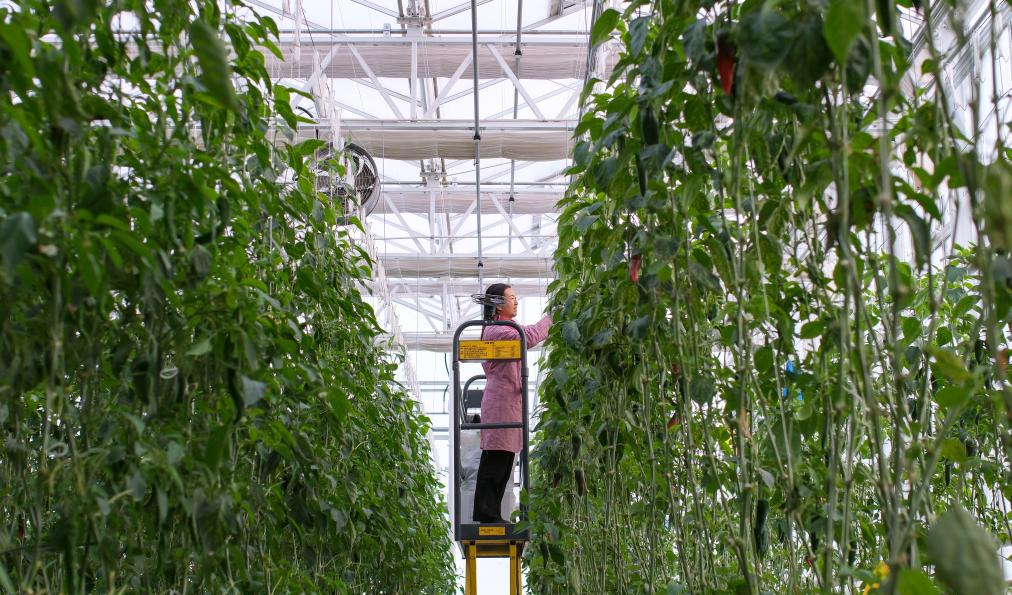
A staff member works at an agriculture science and technology exhibition hall in Changji, Northwest China's Xinjiang Uygur autonomous region, Dec 19, 2023. [Photo/Xinhua]
Despite some Western political forces continuing to run smear campaigns about the human rights situation in the Xinjiang Uygur autonomous region, it won't deter the region from opening up further to the world, the region's top official said.
"Human rights development in Xinjiang has made significant and obvious progress, but some Western political forces still choose to confuse the public and deliberately launch smear campaigns to interrupt the region's development in the name of human rights protection. I believe words are but wind, but seeing is believing," Erkin Tuniyaz, the chairman of the region, said in an exclusive interview with China Daily on the sidelines of the ongoing annual session of the 14th National People's Congress, China's top legislature.
Determined to improve awareness of the real situation in Xinjiang, many people were invited to visit the region last year. When people visit in person, the lies that they hear about it collapse by themselves, he said.
He added that in January, foreign diplomats and representatives affiliated to the Shanghai Cooperation Organization were invited to sit in during the annual sessions of the Xinjiang Regional People's Congress and the regional committee of the Chinese People's Political Consultative Conference for the first time. The chairman said this helped the visitors learn about Xinjiang's achievements in respecting and protecting the human rights of people from different ethnic groups.
"Xinjiang will be more and more opened-up. I sincerely welcome more people from all over the world to come to the region for sightseeing or investing in businesses so they can see the real Xinjiang, which is beautiful, harmonious, prosperous and stable, with their own eyes," Erkin Tuniyaz said.
Despite being targeted by some Western countries that have imposed a series of sanctions on Xinjiang-related products in recent years, Xinjiang's total imports and exports surpassed 357 billion yuan ($49.6 billion) in 2023, a record high, representing a year-on-year increase of 45.9 percent. The increase is the second highest registered by a provincial-level region in China.
Trade between Xinjiang and Central Asian countries increased 53 percent year-on-year, accounting for 80 percent of Xinjiang's total foreign trade. The region, which shares borders with eight countries including Kazakhstan, Tajikistan and Pakistan, currently has 18 land ports exclusively catering to foreign trade.
"The opportunities brought about by the Belt and Road Initiative and the establishment of the China (Xinjiang) Pilot Free Trade Zone have placed Xinjiang, which is an inland region, in the forefront of opening-up," the chairman said.
In November, the FTZ, the first in China's northwestern border regions, officially started operations. With a total area of nearly 180 square kilometers, the FTZ encompasses areas including Urumqi, the regional capital, Horgos in the north and Kashgar in the south.
"The move is a key decision made by the central government and a milestone in the region's progress of pushing for high-level opening-up," Erkin Tuniyaz said.
In particular, the FTZ will help to deepen cooperation between Xinjiang and Central Asian countries. The region will accelerate the speed of improving railway, road and civil aviation networks as well as pipelines with those countries, he said.
The FTZ is expected to make great contribution to Xinjiang's integration with the "dual circulation" of domestic and international markets and support the core area development of the BRI, he added. It will also play a significant role in building a "golden channel" between Asia and Europe, and a frontier for China's westward opening-up.









